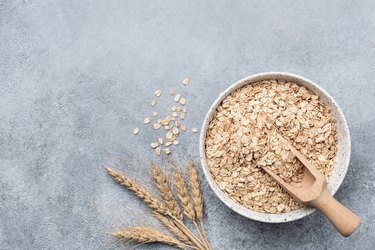
Many people know the benefits of oats for energizing carbohydrates and fiber to start their day. But amazingly, oats and oatmeal are also a great source of natural protein for people looking to boost their protein intake without extra meat.
Tip
One cup of cooked oatmeal, or just about one-half cup measured dry, has nearly 6 grams of protein.
Video of the Day
Benefits of Higher Protein Diet
The National Institute of Health recommends an intake of 0.8 grams of protein per kilogram of your body weight every day. However, the amount of protein you need depends on many factors including age, activity level and fitness goals, and some people may benefit from higher protein diets.
Video of the Day
For example, The Academy of Nutrition and Dietetics recommend 1.2 to 2.0 grams of protein per kilogram of body weight per day for athletes looking to optimize muscle growth and performance.
Furthermore, an August 2012 review study published in the British Journal of Nutrition concludes that a protein intake of 1.2 grams of protein per kilogram of body weight results in the most beneficial body composition and blood pressure outcomes for people with obesity attempting weight loss. Protein can help improve metabolism, the feeling of fullness and maintenance of lean body mass despite caloric restriction.
For all these reasons, the protein in oats may contribute to a higher protein diet, which can help athletes and those attempting weight loss reach their personal goals.
How Much Protein in Oatmeal?
Measured dry, the protein in oats is 5.9 grams per one-half cup. When cooked, this turns into just about 1 cup of cooked oatmeal. However, the protein in oatmeal can be as high as 20 grams if cooked with 1 cup of milk and topped with one-quarter cup of almonds for a complete meal.
When using single-serve packets of oatmeal, the portion is smaller. The protein in oatmeal from a packet of instant oatmeal is only 3.3 grams. Furthermore, single-serve packets of oatmeal are often flavored with added sugars. This doesn't affect the protein content, but does increase the total carbohydrate and sugar content.
Quality of Protein in Oats
When most people think about protein, their mind goes to meat and dairy. Indeed, poultry, fish, red meat, eggs, milk and cheese are excellent sources of protein containing high levels of all essential and non-essential amino acids. However, many plant-based foods like nuts, seeds, beans and high-protein grains can contribute to the protein in your diet as well.
Though usually considered an incomplete protein, one benefit of oats is that they do contain all nine essential amino acids. This amino acid profile is superior to most other cereal grains, like wheat, making the protein in oats a favorite for vegetarians and vegans alike.
However, the amount in which these amino acids are present is still drastically lower than found in animal products, like meat. A February 2015 review study in Journal of Food Science and Technology agrees that oats are a superior protein source compared to other cereal grains, however, glutamine and proline are found in much lower amounts compared to complete protein sources.
Other Nutrition Benefits of Oats
In addition to its high protein and excellent amino acid profile, there are many other benefits of oats. Oats are also a source of whole grains, which according to the USDA MyPlate Guidelines, should make up at least half of your grains consumed daily. Whole grains like oatmeal and brown rice provide more B vitamins, iron and fiber than refined grains.
Fiber is another benefit of oats, as this helps improve digestion, gut health and regulate bowel movements. Harvard Health even notes that a bowl of oatmeal providing 1 to 2 grams of soluble fiber can help lower cholesterol.
Read More: When You Have Diarrhea, a Bowl of Oatmeal Can Help
- MyFoodData: "Nutrition Facts for Cooked Oatmeal"
- National Institute of Health: "Nutrient Recommendations: Dietary Reference Intakes (DRI)"
- Academy of Nutrition and Dietetics: "Protein and the Athlete — How Much Do You Need?"
- Brittish Journal of Nutrition: "Dietary Protein – Its Role in Satiety, Energetics, Weight Loss and Health"
- MyFoodData: "Nutrition Facts of Oasts Instant Fortified Plain"
- Journal of Food Science and Technology: "Nutritional advantages of oats and opportunities for its processing as value added foods - a review"
- Harvard Health: "11 Foods That Lower Cholesterol"
- USDA: "What Foods are in the Grains Group?"